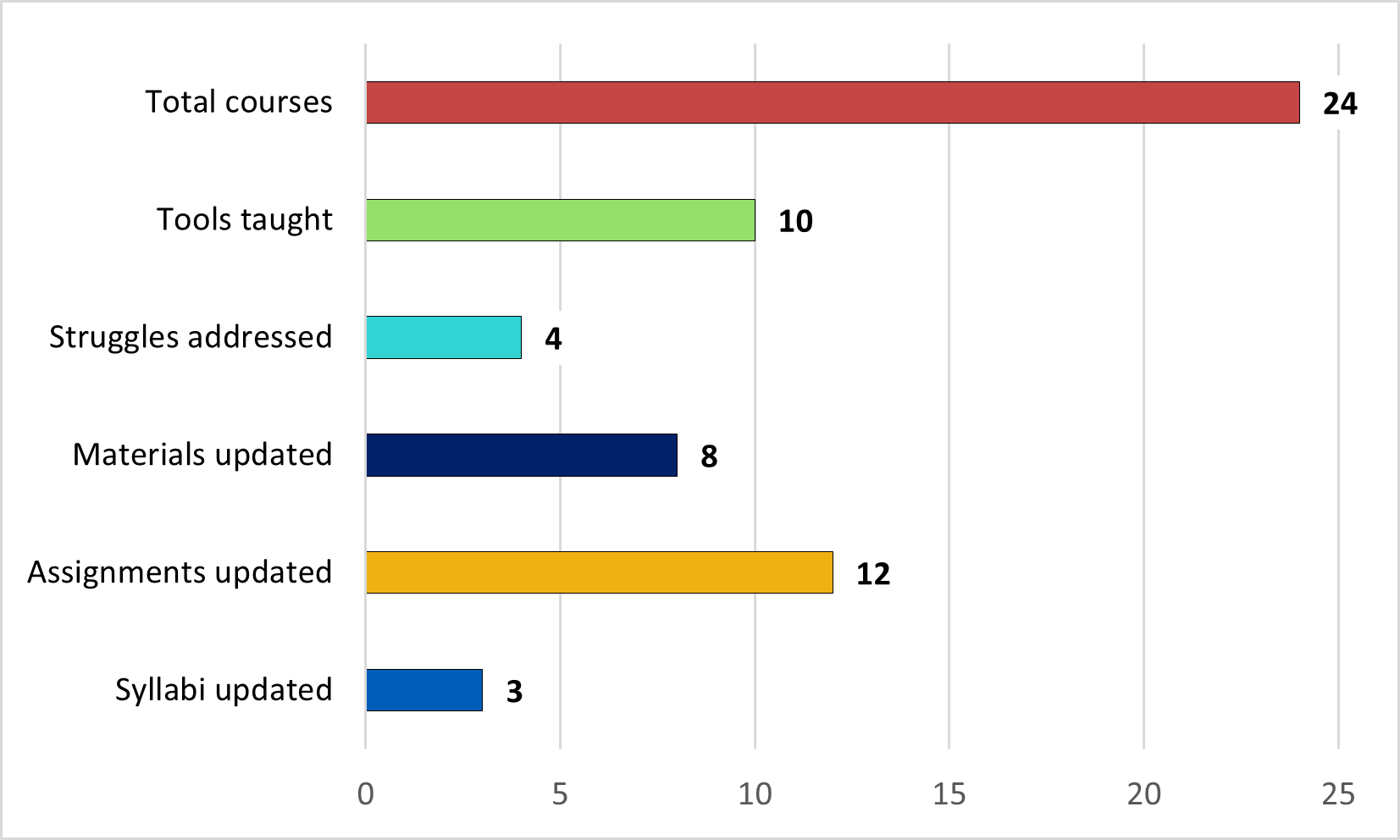Empowering Educators with Accessibility Workshops — A Personal Reflection
I created a series of workshops this summer intended to help faculty make their courses more accessible. They were extremely effective, well beyond our expectations, so I wanted to share what made them different from our typical accessibility initiatives, and how I plan to scale them going forward.
Outcomes and impact
Right from the start I knew we had something. We only had ten stipends to give out, so we expected ten people to register. Instead, nearly twice as many people registered [1], even after updating the registration form to clarify that we ran out of stipends. The data backed up my prediction:

| Metric | Number impacted [1] | Explanation |
|---|---|---|
| Total courses | 24 | Total courses taught by participants who completed the workshop, not counting different sections of a course taught by the same instructor |
| Tools taught | 10 | Accessibility tools, or accessibility features of tools already in use |
| Struggles addressed | 4 | Personal/professional struggles identified by participants, addressed from an accessibility perspective |
| Materials updated | 8 | Unique course materials updated during workshops/homework |
| Assignments updated | 12 | Unique assignments updated during workshops/homework |
| Syllabi updated | 3 | Updated during workshops/homework |
The feedback from participants was overwhelmingly positive. Every respondent rated their overall experience with the workshops 5 out of 5 stars, and its relevance to their needs and goals as 4/4 [2]. Everyone who completed the workshops also expressed enthusiasm at improving their courses’ accessibility, and it gave them the knowledge and skills needed to do so [1].
Why this worked
The workshops were as successful as they were because of three main reasons:
- Emphasis on engagement. I have found that faculty really respond to improving student engagement. Students learn much better when they’re engaged [3], and we’re still dealing with post-pandemic disengagement [4][5]. It’s also just a lot more fun to teach a classroom full of students engaged in the subject.
- Minimizing required work. I once had a faculty member come in saying that he was going to delete all the images from his course instead of adding alt-text. He had just run the automated accessibility checker for the first time, and it told him that his hundreds of images didn’t have alt-text. Retrofitting accessibility can be an overwhelming amount of work, and sometimes it can feel unmanageable. The workshops gave faculty members systemic approaches to decrease the amount of work required, such as quick ways of adding multiple means of representation to preexisting materials, and boilerplate for allowing students to help create multiple means of action and expression. They also gave participants dedicated time (homework) to make substantial progress, and I frequently reiterated that any improvement to your course — no matter how small — is still an improvement to your course.
- Personal connection. The primary objective of the workshops was for participants to personally relate to the importance and benefits of accessibility. I’ve learned through my previous presentations and workshops that people respond strongest to stories, not data. The key difference with these workshops was that participants developed first-hand experience. I did this through solving participants’ personal or professional problems via an accessibility lens.
The personal connection was the key difference between these workshops and previous initiatives. It’s why they created actual change instead of a strong sense of sympathy or importance, as most of my previous efforts have. The personal connection left participants inspired to improve their accessibility, and the practical knowledge and skills empowered them to.
Scaling and lessons
The workshops were extremely successful, and made a noticable impact in both the actual level of accessibility at NECC and people’s attitudes towards it. That’s significant for any initiative, let alone one this small.
Unfortunately, the workshops are too resource-intensive to scale in the current form. Additionally, participants wanted improved scheduling, structure, and scope [2]. To address these issues, I’m developing the workshops further into an online Competency-Based Education (CBE) course (working title “Educational Accessibility”). A formal course will allow for increased scope and structure, and is a more efficient use of resources. CBE is also a useful model here because it offers flexibility and allows students to go at their own pace, which will help tailor the course to each student. We’re also looking into certifications and incentives for faculty to complete the course, which will further drive demand.
I’m really excited about this, and I can’t wait to see the level of impact the more-refined program will have. If you’re interested in learning more about the workshops or course, or want to get involved, please feel free to reach out
References
- DJ Chase; “Engaging Students with Accessibility Public Data”. Haverhill, MA, US; Northern Essex Community College; 2024-10-03. https://studentnecc-my.sharepoint.com/:x:/g/personal/dchase_necc_mass_edu/Ef0YuLKisBdCu7OrkvujlT8B0B7ZrOFlQPFhRDKUsptGoQ
- DJ Chase; “Engaging Students with Accessibility Feedback Data”. Haverhill, MA, US; Northern Essex Community College; 2024-10-03. https://studentnecc-my.sharepoint.com/:x:/g/personal/dchase_necc_mass_edu/EcU2SzqT2rFFoNhLuBB5eG4ByK0XuiEnkiMZG6nYz0HceQ
- CAST; “Engagement” in “UDL Guidelines”; version 3.0. Lynnfield, MA, US; 2024. https://udlguidelines.cast.org/engagement/ (also available from https://archive.ph/fUvhI)
- Beth McMurtrie; “A ‘Stunning’ Level of Student Disconnection”. Washington, DC; The Chronicle of Higher Education; 2022-04-05. https://www.chronicle.com/article/a-stunning-level-of-student-disconnection (also available from https://archive.ph/QX61M)
- Erin Gretzinger and Maggie Hicks; “Why Campus Life Fell Apart”. Washington, DC; The Chronicle of Higher Education; 2024-01-26. https://www.chronical.com/article/why-campus-life-fell-apart (also available from https://archive.ph/piKrb)